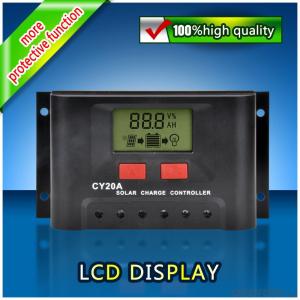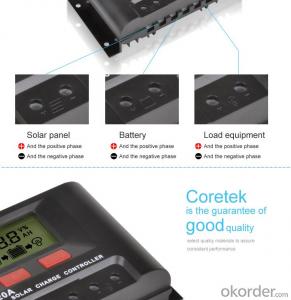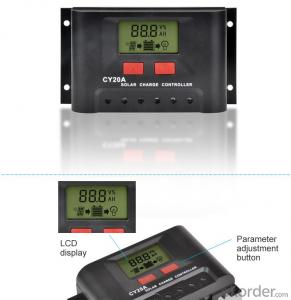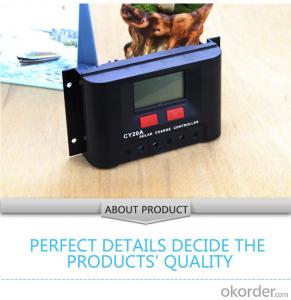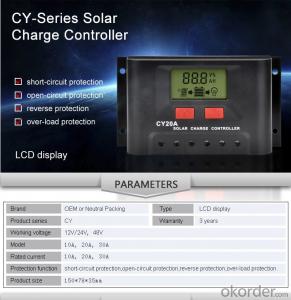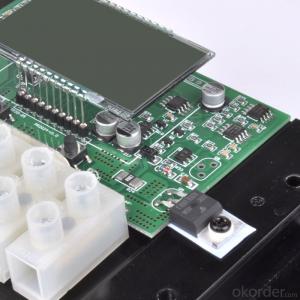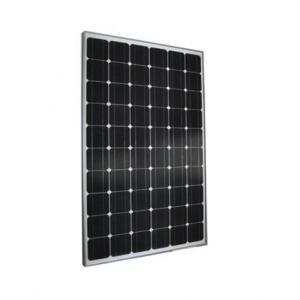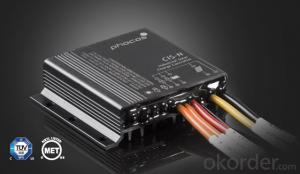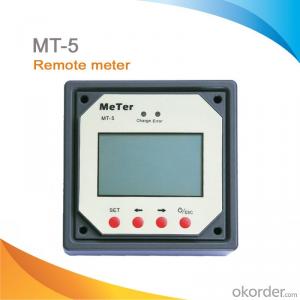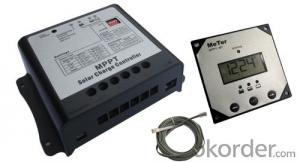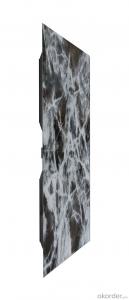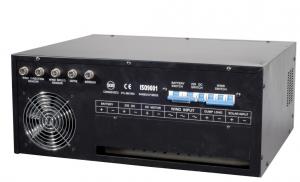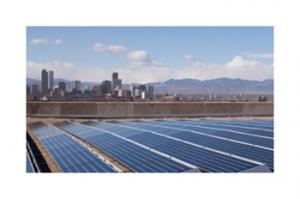Solar LCD Controller CY20B with the best price
- Loading Port:
- China main port
- Payment Terms:
- TT or LC
- Min Order Qty:
- 1 unit
- Supply Capability:
- 10000 unit/month
OKorder Service Pledge
OKorder Financial Service
You Might Also Like
Product Introduction
Solar controller is control device which can control solar panel and transform solar energy into electricity then store to the battery bank. Solar controller is the most important part in offgrid system, whose performance has much effect on life expectancy and operation of the whole system, especially the battery expectancy.
Application Areas
Standalone Photovoltaic power station
Standalone Domestic household photovoltaic power system
Mobil communication base stations, expressway and other non-residential regions.
Coastal islands, remote mountainous, border posts for regions shortage of or without electricity.
Government demonstration projects, landscape lighting project etc.
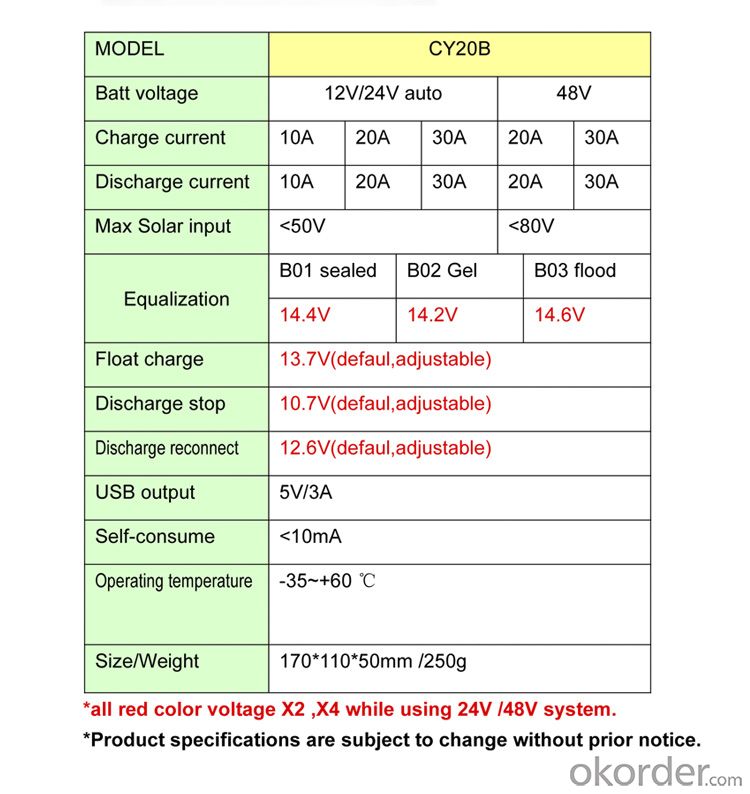
Selection of high-quality materials properties be consistent from beginning to end
For life is a convenient
A little more secure
The innovation design idea of the perfect show
The first set of people-oriented
The high-end configuration components
- Q:What are the advantages of using a solar controller?
- There are several advantages to using a solar controller. Firstly, it helps to regulate the charging and discharging of batteries in a solar power system, ensuring that they are charged efficiently and protected from overcharging or deep discharge. This prolongs the lifespan of the batteries and maximizes their performance. Additionally, a solar controller prevents reverse current flow from the batteries to the solar panels during low or no sunlight conditions, preventing any damage to the panels. It also provides valuable information about the system's performance, such as battery voltage, solar panel output, and load consumption, allowing for better monitoring and optimization of the system. Overall, a solar controller enhances the efficiency, reliability, and longevity of a solar power system.
- Q:Can a solar controller be used with solar panel ground racks?
- Yes, a solar controller can be used with solar panel ground racks. The solar controller regulates the flow of electricity from the solar panels to the connected batteries or grid, regardless of whether the panels are mounted on the ground or on rooftops.
- Q:How do I protect a solar controller from theft or vandalism?
- There are a few effective measures you can take to protect a solar controller from theft or vandalism. Firstly, consider installing the controller in a secure and inconspicuous location, making it less visible and accessible to potential thieves. Additionally, you can use tamper-proof screws or locks to secure the controller's enclosure, making it harder to remove. Installing a surveillance camera or an alarm system in the vicinity can act as a deterrent and help in identifying any suspicious activity. Lastly, it's advisable to clearly mark the solar controller with warning signs indicating surveillance or security measures, which can discourage potential vandals or thieves.
- Q:How does a solar controller handle fluctuations in solar irradiance?
- Optimizing the energy output from solar panels involves the utilization of various mechanisms and control strategies by a solar controller. To begin, the solar controller continuously monitors the solar irradiance levels in real-time through the use of sensors or photovoltaic cells. This enables the measurement of the sunlight's intensity hitting the panels. When fluctuations in solar irradiance occur, the solar controller employs the technique known as maximum power point tracking (MPPT) to maximize energy generation. MPPT algorithms track the solar panels' maximum power point, which is the point at which the panels produce the most energy given the current sunlight conditions. By constantly adjusting the voltage and current levels to match the optimal power point, the solar controller ensures that the panels operate at maximum efficiency despite the fluctuations in solar irradiance. Additionally, some advanced solar controllers incorporate cloud tracking algorithms. These algorithms make use of predictive models to estimate the duration and intensity of cloud cover. By anticipating changes in solar irradiance due to cloud movements, the solar controller can proactively adjust the power output of the panels to compensate for the temporary decrease in sunlight. Furthermore, solar controllers may include features such as voltage regulation and load balancing. Voltage regulation ensures that the energy generated by the solar panels remains within the desired voltage range, protecting connected devices and preventing overcharging or undercharging of battery systems. Load balancing ensures that the energy generated by the solar panels is evenly distributed across multiple loads, optimizing the overall performance of the system. In conclusion, a solar controller effectively manages fluctuations in solar irradiance by utilizing MPPT algorithms, cloud tracking, voltage regulation, and load balancing techniques. These mechanisms enable the solar panels to operate at maximum efficiency and extract the highest possible energy yield from varying solar irradiance conditions.
- Q:Can a solar controller be used with portable solar panels?
- Yes, a solar controller can be used with portable solar panels. A solar controller helps regulate the charging process and protects the battery from overcharging. It can be especially beneficial for portable solar panels as it ensures optimal charging efficiency and prolongs the battery life.
- Q:How does a solar controller prevent damage to the solar panels from power surges?
- A solar controller prevents damage to solar panels from power surges by regulating the flow of electricity between the panels and the battery. It acts as a barrier, blocking excessive voltage or current that may occur during power surges, ensuring that only the optimal amount of power is supplied to the panels, thus protecting them from potential damage.
- Q:Can a solar controller be used with solar-powered streetlights?
- Yes, a solar controller can be used with solar-powered streetlights. A solar controller regulates the charging and discharging of the solar battery, ensuring efficient power management. It helps to maintain the battery's health and prevent overcharging or discharging, thus extending the lifespan of the battery. Therefore, a solar controller is an essential component for the effective operation of solar-powered streetlights.
- Q:Can a solar controller be used with solar-powered camping equipment?
- Yes, a solar controller can be used with solar-powered camping equipment. A solar controller is designed to regulate the charging and discharging of batteries connected to solar panels, ensuring optimal power output and preventing overcharging or damage to the equipment. Using a solar controller with solar-powered camping gear can help maximize energy efficiency and extend the lifespan of the batteries.
- Q:What is the operating temperature range of a solar controller?
- The operating temperature range of a solar controller typically varies depending on the specific model and manufacturer. However, most solar controllers are designed to operate within a temperature range of -20°C to 60°C (-4°F to 140°F). These temperature limits ensure that the controller can effectively regulate the flow of electricity and manage the charging and discharging of the battery in various weather conditions. It is important to note that extreme temperatures, especially on the higher end of the range, may affect the efficiency and performance of the controller, so it is advisable to install the controller in a well-ventilated, shaded area to minimize any potential heat-related issues.
- Q:What is the maximum load capacity that a solar controller can handle?
- The maximum load capacity that a solar controller can handle depends on its make and model. The load capacity is typically specified by the manufacturer and can vary greatly. It is important to consult the product specifications or contact the manufacturer for accurate information regarding the maximum load capacity of a specific solar controller.
1. Manufacturer Overview |
|
|---|---|
| Location | |
| Year Established | |
| Annual Output Value | |
| Main Markets | |
| Company Certifications | |
2. Manufacturer Certificates |
|
|---|---|
| a) Certification Name | |
| Range | |
| Reference | |
| Validity Period | |
3. Manufacturer Capability |
|
|---|---|
| a)Trade Capacity | |
| Nearest Port | |
| Export Percentage | |
| No.of Employees in Trade Department | |
| Language Spoken: | |
| b)Factory Information | |
| Factory Size: | |
| No. of Production Lines | |
| Contract Manufacturing | |
| Product Price Range | |
Send your message to us
Solar LCD Controller CY20B with the best price
- Loading Port:
- China main port
- Payment Terms:
- TT or LC
- Min Order Qty:
- 1 unit
- Supply Capability:
- 10000 unit/month
OKorder Service Pledge
OKorder Financial Service
Similar products
New products
Hot products
Hot Searches
Related keywords
